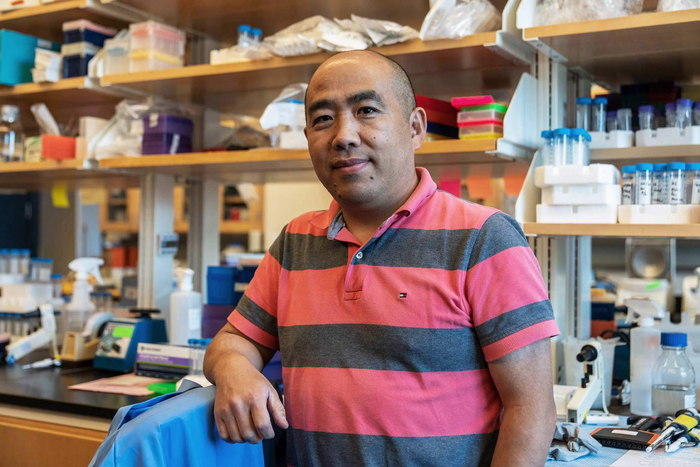UVA Health researchers have identified a potential treatment to prevent severe COVID-19 in patients at great risk.

Credit: Photo by Erin Edgerton, University Communications
UVA Health researchers have identified a potential treatment to prevent severe COVID-19 in patients at great risk.
The new research from UVA’s Jie Sun, PhD, and colleagues suggests a way to protect patients with obesity or diabetes from the runaway inflammation and dangerous blood sugar spikes that COVID-19 can cause. Such patients are at high risk for severe COVID-19, and, with the effectiveness of existing COVID treatments waning, new treatment options are needed urgently.
“Our work has uncovered a metabolic pathway that concurrently modulates COVID-19 inflammation, lung recovery and host metabolic health, and suggests a potentially viable therapeutic agent that may be combined with existing anti-viral agents to treat severe COVID-19 in patients with underlying metabolic disease,” said Sun, of UVA’s Division of Infectious Diseases and International Health and UVA’s Carter Immunology Center. “We are hoping this study could spur strong interests for clinical trials to prevent or treat severe viral infections including COVID-19 in diabetic and/or obese individuals using a second-generation insulin sensitizer.”
Preventing Severe COVID-19
Sun’s approach seeks to prevent severe COVID-19 by targeting the carrier of fuel to mitochondria, the powerhouses of our cells. Sun and his team found that reducing the activity of this carrier protected obese lab mice from severe illness caused by influenza and COVID-19. The reduction of the fuel supply simultaneously reduced harmful inflammation and promoted metabolic health. It also helped prevent harmful blood sugar spikes associated with COVID-19 and promoted lung recovery after COVID-19 and influenza pneumonia.
The researchers noted that their approach “synergized” with the antiviral component of Paxlovid, nirmatrelvir, to “markedly” reduce mortality in the lab mice. That suggests it may be possible to use an insulin-sensitizing drug to obtain similar results in human patients with COVID-19.
“We know that steroids are effective in severe COVID-19, but these drugs have side effects like elevated blood glucose that make their use more complicated in obese and diabetic patients,” said study co-author Jeffrey Sturek, MD, PhD, a UVA pulmonary and critical care physician-scientist specializing in COVID-19 disease. “The really exciting part about this pathway is the ability to treat both inflammation as well as altered glucose metabolism.”
To assess the potential benefits in humans, the scientists tested their approach using human lung tissue samples. They were pleased to see the drug diminished cellular inflammation – a promising sign, though more testing will be needed.
Based on the results, the UVA scientists and Cirius Therapeutics – the maker of the insulin-sensitizing drug the scientists used – are planning a clinical trial testing the drug in human patients with COVID-19. Cirius Therapeutics is developing the drug to treat liver damage in patients with non-alcoholic fatty liver disease. The drug works through a recently identified mechanism to reprogram mitochondrial metabolism and has an “outstanding” safety profile, the researchers note in a scientific paper outlining their findings.
That leaves the UVA scientists hopeful that their new research could make a real difference for people at high risk for severe COVID-19.
“Diabetes increases COVID-19 severity, and, conversely, COVID-19 can lead to blood glucose rise,” Sun said. “Our work suggests that we can use a second-generation Thiazolidinedione drug to break the network of SARS-CoV-2 infection, hyperglycemia [blood glucose rise] and hyper-inflammation, all factors known to drive COVID-19 pathophysiology.”
Findings Published
The researchers have published their findings in the journal Science Immunology. The team consisted of Bibo Zhu, Xiaoqin Wei, Harish Narasimhan, Wei Qian, Ruixuan Zhang, In Su Cheon, Yue Wu, Chaofan Li, Russell G. Jones, Mark H. Kaplan, Robert A. Vassallo, Thomas J. Braciale, Lindsay Somerville, Jerry R. Colca, Akhilesh Pandey, Patrick E. H. Jackson, Barbara J. Mann, Connie M. Krawczyk, Jeffrey M. Sturek and Sun. Sun is a consultant for TeneoFour; a full list of the authors’ disclosures is included in the paper. UVA is seeking a patent on the use of the drug, MSDC-0602K, and combinations in treating severe viral pneumonia.
The research was supported by the National Institutes of Health, grants AI147394, AG069264, AI 112844 and AI 154598 and Interdisciplinary Training Program in Immunology T32 AI007496.
To keep up with the latest medical research news from UVA, subscribe to the Making of Medicine blog at http://makingofmedicine.virginia.edu.
Journal
Science Immunology
DOI
10.1126/sciimmunol.adf0348
Article Publication Date
23-Feb-2023




